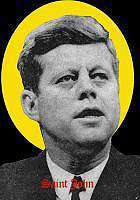
What luck for the rulers that men do not think.
—Adolf Hitler
Through the shrouds of the smoke screen of History, we vaguely discern how the awesome power of the Priests,
those faithful and honest servants of god, was, as specialism grew, gradually taken over by the War Lords; a process still going on. But the War Lords grew impatient with the slow progress; they wanted more, faster—
and came up with a new and brilliant idea.
The best government is a benevolent tyranny tempered by an occasional assassination.—VoltaireThe eternal struggle between the State and man.
—Jean Shepherd, In God We Trust, All Others Pay CashHain't we got all the fools in town on our side?
And isn't that a big enough majority in any town?
—Mark Twain, The Adventures of Huckleberry Finn
As democracy is perfected, the office of president represents, more and more closely, the inner soul of the people.
On some great and glorious day the plain folks of the land will reach their heart's desire at last
and the White House will be adorned by a downright moron.
—H.L. Mencken (1880-1956)








